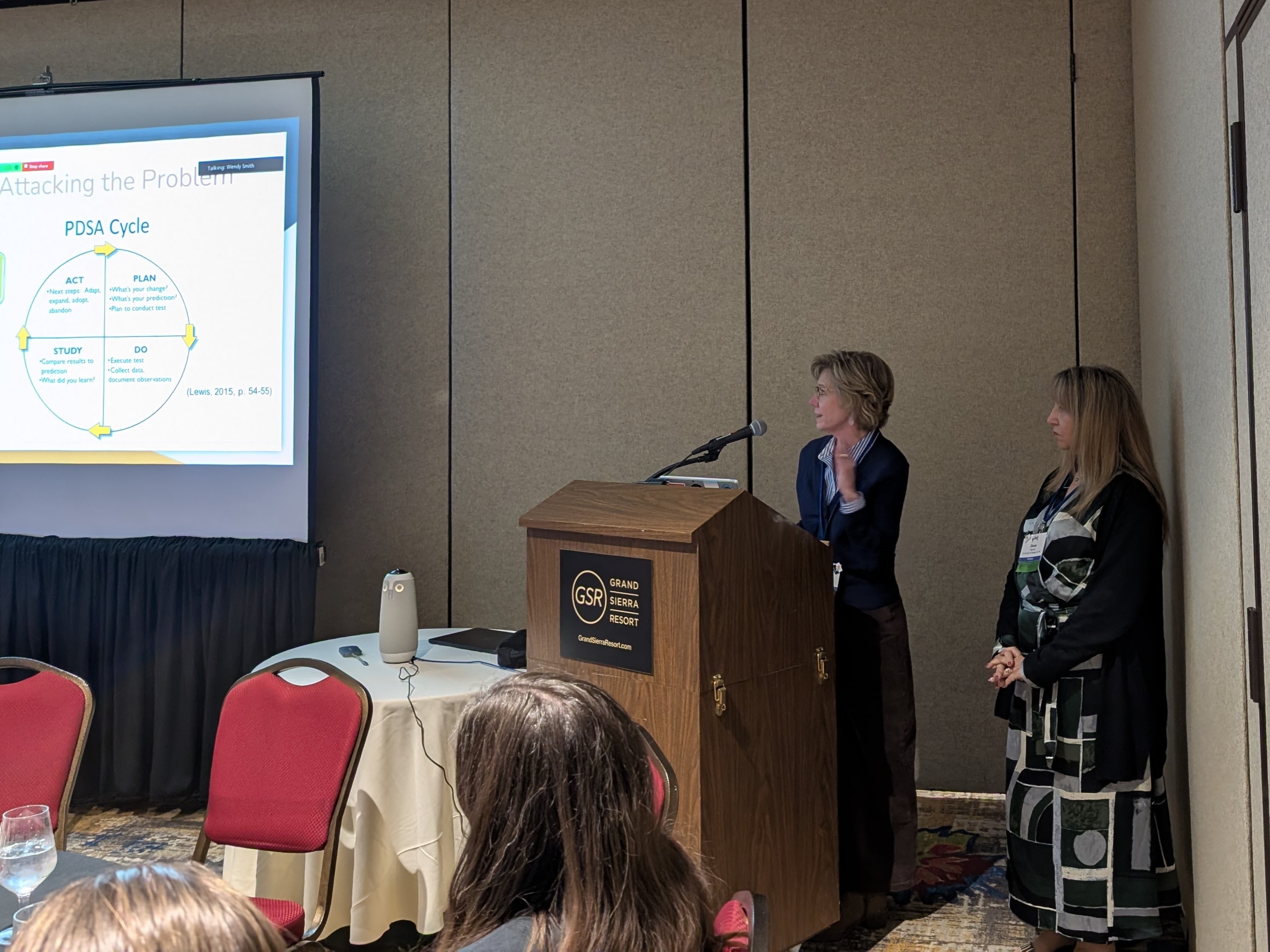
By Amy Been Bennett and Wendy M. Smith, MTEP Research Hub members
The 2025 Annual Association of Mathematics Teacher Education (AMTE) Conference program included 12 sessions that were marked as featured Mathematics Teacher Education Partnership (MTEP) sessions. Some of these sessions were explicitly connected to MTEP, the MTEP aim/drivers, and/or networked improvement community (NIC) processes like PDSA (plan-do-study-act) cycles; in other sessions, MTEP members shared research that represents implicit connections to MTEP and on topics related to the AMTE Standards (2017).
One way to consider these 12 sessions is to use a lens of zooming in and zooming out. Little (2012) discusses zooming in and zooming out as separate from micro- vs. macro-level or institutional vs. individual foci. Rather, “the metaphors of ‘zooming in’ and ‘zooming out’ [...] allow for a characterization of practice that is both constituted in and through interaction and made meaningful within the web of activity and relationships that make up life in a given institutional domain” (p. 160). Two MTEP sessions at AMTE were zoomed out in that presenters explicitly connected their work to broader MTEP aims, principles, and drivers, while the rest were more zoomed in to look at specific research or practices related to preservice mathematics teacher preparation with less explicit connections to MTEP.
The two zoomed-out sessions examined or applied MTEP at a broad level. First, Dana Franz and Diane Barrett talked about how we as a network need to advocate for the value and worth of our teacher preparation programs. Franz and Barrett specifically held up MTEP as a model for how mathematics teacher educators can collectively leverage a network to solve common problems of practice. Second, Margaret Mohr-Schroeder, Marilyn Strutchens, and Gary Martin co-led a policy-focused session that drew on the work of the MTEP policy subhub to address some ways teacher preparation programs could navigate the current political climate and dynamic state contexts.
Some of the MTEP-related sessions represented zoomed-in views of MTEP principles and AMTE Standards, presenting about practices of math teachers or math teacher educators. For instance, Allison McCulloch, Jennifer Lovett, Lara Dick, Nina Bailey, Charity Cayton, and Josh Wilson presented their research on different ways to measure preservice teachers’ preparedness to teach math with technology. James Kirwan, Yi-Yin Ko, and Juan Manuel Gerardo shared their research on preservice teacher perceptions of the disconnect between college math courses and how preservice teachers are being asked to teach. Grace Pai, Liza Bondurant, Madelyn Colennese, Carrie Lee, Heather Howell, Bima Sapkota, Jamaal Young, and Erin Barno zoomed in to look at how to facilitate rehearsals and simulations to improve preservice teachers’ instruction.
Further presentations zoomed in on inservice teacher support. For example, Jeremy Zelkowski, Felicia Smith, and Chalandra (Cha Cha) Gooden shared their analysis and lessons learned about communities of practice from master teachers’ videos submitted for national board certification, as part of a larger professional development program. Gina Wilson and Joyce Lin shared a tool for early career STEM teachers to understand complex systems to help them navigate collaborative collegial relationships. Collectively, these zoomed-in approaches that look at the work of preservice teacher preparation and inservice teacher support are useful for MTEP NICs as NICs prioritize different dimensions of preservice teacher preparation and inservice teacher support as their foci.
Looking with both zoomed-out and zoomed-in lenses, there were five sessions that focused on or directly mentioned equity and equitable teaching practices. Anthony Fernandes, Ksenija Simic-Mueller, and Travis Weiland shared how they use statistics as a tool to understand how institutionalized laws and policies about race play a role in public data, such as traffic stop data. They do this activity with preservice teachers in middle and secondary grades in the hope that preservice teachers will feel comfortable talking about statistics and equity in their own classes. Jeffrey Hovermill’s discussion of collaborations and partnerships with Native American Service Schools focused on implementing culturally sustaining STEM teaching; the foundation of those partnerships was the formation of the Northern Arizona MTEP NIC.
Some sessions used improvement science to understand and report on specific processes and outcomes within their programs. For example, Robin Keturah Anderson, Ruby Ellis, Meggan Quist, Cyndi Edgington, Kenya Lawrence, and Lorraine Males reported on their use of a PDSA structure to create and refine modules centered around mathematics identity for grades 6-12 math methods courses. Additionally, Amy Nebesniak and Ted Rupnow provided a detailed process about how to leverage research and engage with data to create retention-focused teacher preparation program changes; their efforts were prompted by looking at data related to Nebraska NIC drivers.
The diverse work of MTEP NICs was evident throughout sessions at AMTE (and the rest of the year). Research and propagating ideas at both zoomed-out and zoomed-in levels are valuable to help NICs progress with program transformation efforts. A key MTEP driver is knowledge sharing; learning what other NICs are doing can accelerate the work of your own NIC. Sessions where researchers had data and framed their work around PDSA cycles tended to be particularly compelling and accessible for adapting to one’s own context. A big thanks to the presenters who explicitly acknowledged connections to MTEP; these connections help MTEP scale up to reach more secondary mathematics teacher preparation programs.
References
Association of Mathematics Teacher Educators. (2017). Standards for preparing teachers of mathematics. http://amte.net/standards
Little, J. W. (2012). Understanding data use practice among teachers: The contribution of micro-process studies. American Journal of Education, 118(2), 143-166. https://doi.org/10.1086/663272